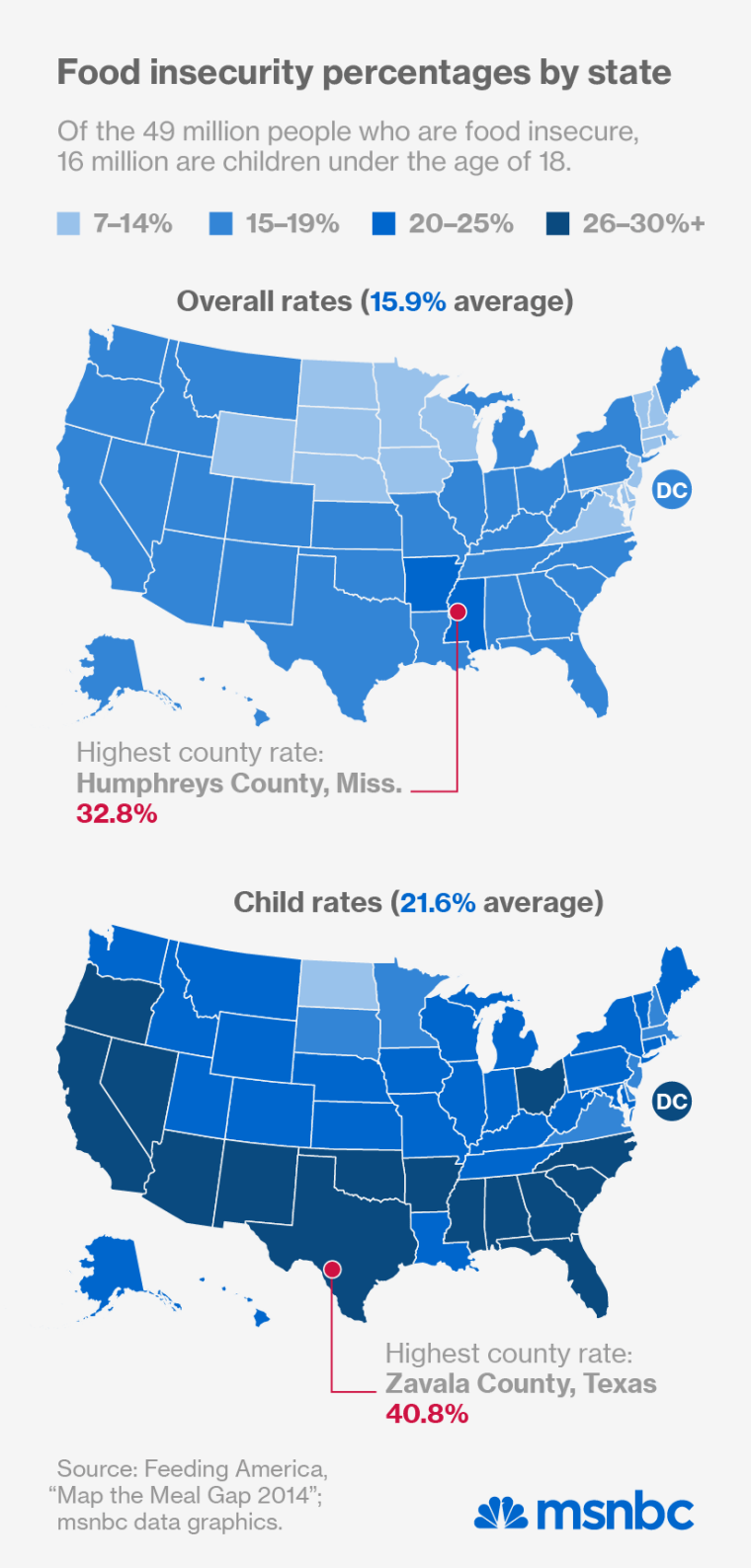Welcome to Humphreys County, Mississippi. Population: 9,189. Poverty rate: 41.2%. Food insecurity rate: 32.8%, the highest in the nation.
Earlier this week, the national anti-hunger organization Feeding America released its annual "Map the Meal Gap" report, which measures food insecurity on a county-by-county basis across the United States. Using USDA data from 2011-2012, this report made it possible to isolate the hungriest regions of the country, measured by both child food insecurity and overall insecurity.
The USDA defines food insecurity as lack of access to "enough food for an active, healthy life." By that measure, Humphreys County tops the list for overall food insecurity and Zavala County, Texas, ranks number one in hungry children, coming in at 40.8% child food insecurity.

Dubious distinction aside, Zavala County and Humphreys County share a few other key traits in common: Both are in poor, rural areas of the South, have socially and economically isolated populations, and are represented in Congress by Democrats -- both of whom voted earlier this year to cut food stamps by billions of dollars.
Reps. Bennie Thompson and Pete Gallego joined 87 other House Democrats in late January to help pass the bipartisan 2014 Farm Bill. That bill altered food stamp eligibility rules in 15 states and the District of Columbia, with the aim of reducing benefits for as many as 850,000 households. But Thompson and Gallego's home states were spared.
In a statement to msnbc, Gallego described the cuts in the final version of the Farm Bill as "the best we could do."
"I didn't come to Washington to be part of the problem. It was in the best interests of Zavala and other counties that we move forward with a farm bill and provide certainty to ranchers, farmers, food banks, and other providers," Gallego said.
Thompson—who was unavailable for comment according to his office—echoed that reasoning in a statement released shortly after the vote. The legislation, which also regulates and subsidizes vast swaths of the agricultural industry, "provides a safety net for farmers, while ensuring that no Mississippian participating in [the food stamp program] will see a decrease in their benefits," Thompson said.
Thompson has consistently opposed food stamp cuts in the past. He voted against two prior iterations of the Farm Bill, which would have cut even more out of the program and directly affected members of his district in the process. And in November 2013, he co-signed a letter to ranking members of the House and Senate agriculture committees, urging them not to include benefit cuts in the Farm Bill. What he ultimately voted for was a piece of compromise legislation that cut less than expected and spared his district. He wasn't alone.
"For the members of Congress whose constituencies weren't going to be impacted, I think it was probably harder to oppose those cuts because there wasn't an impact back home," said Lisa Davis, Feeding America's senior vice president of government relations. About half of the Democratic "yes" votes for the Farm Bill came from states affected by the proposed cut, mostly from states like California, which has a thriving agricultural industry.
Many Democrats, including Gallego, defended the cut as a compromise that prevented harsher benefit reductions. Democratic Rep. Jim McGovern of Mass., who represents a district affected by the Farm Bill cuts, dismissed that reasoning.
"If you believe that, I have a bridge to sell you for 10 bucks" he said. "I think that what some of the right-wingers learned was that going after [food stamps] in one big cut was probably unattainable, given that Democrats still control the Senate. I think they believe they can chip away at it."
That means that if Republicans get their way—and especially if the party manages to take control of the Senate in this year's midterm elections—food stamps in Humphreys County and Zavala County might soon be on the chopping block. Leading Republicans House Speaker John Boehner and Wisconsin Rep. Paul Ryan, have already signaled their interest in further cuts.
New York City Coalition Against Hunger executive director Joel Berg said the lack of a "clear message from the national hunger movement" had contributed to bipartisan approval for the Farm Bill. Numerous groups declined to take a position on the bill itself, he said, even as they opposed the cuts.
"We did not oppose the decision of our congressional delegation to vote for the bill," said Texas Food Bank Network CEO Celia Cole, regarding Gallego's vote. "We understood that it was a calculated decision. It was made in the hopes of opposing future cuts, so we didn't take a stand on the bill itself."
But Cole later added: "That was probably part of the rationale from the people behind these cuts. Divide and conquer."
